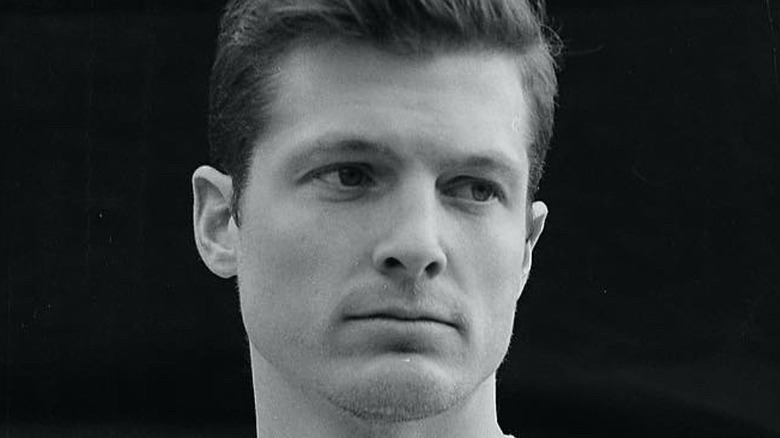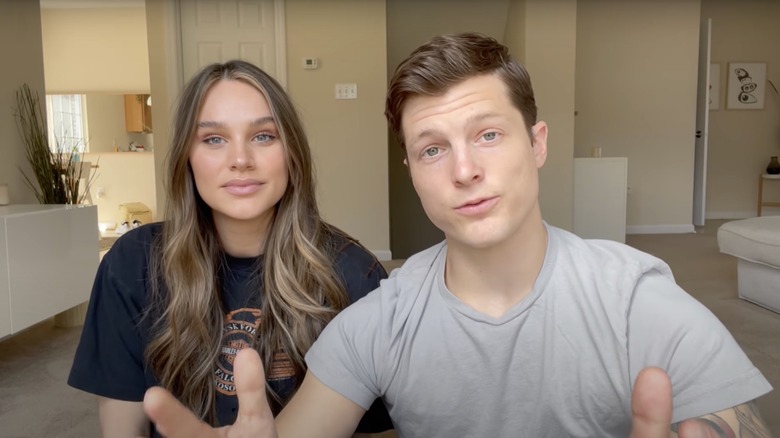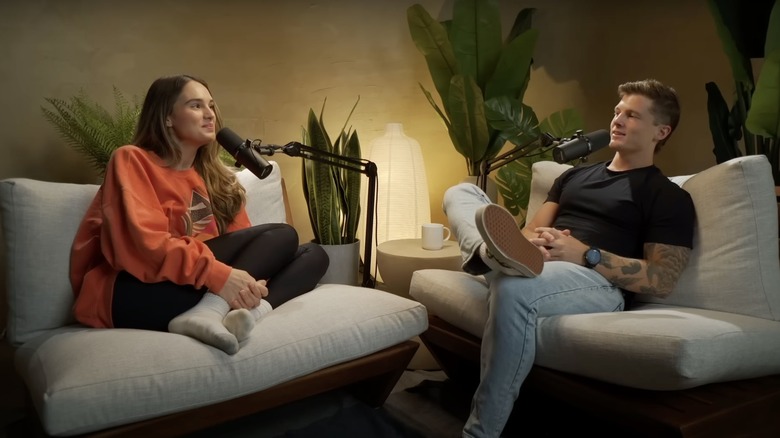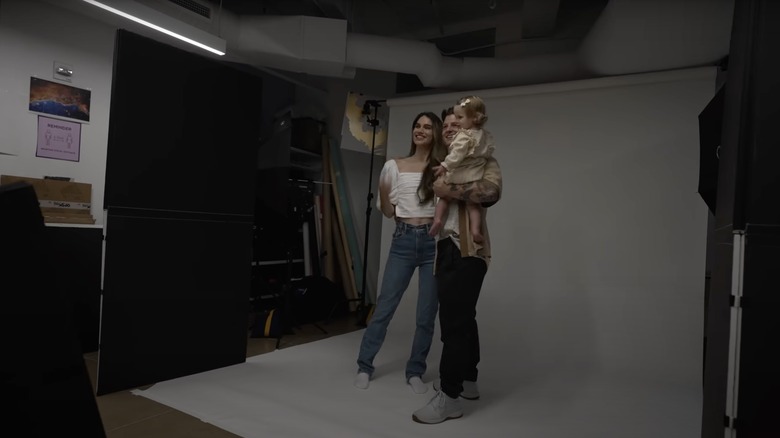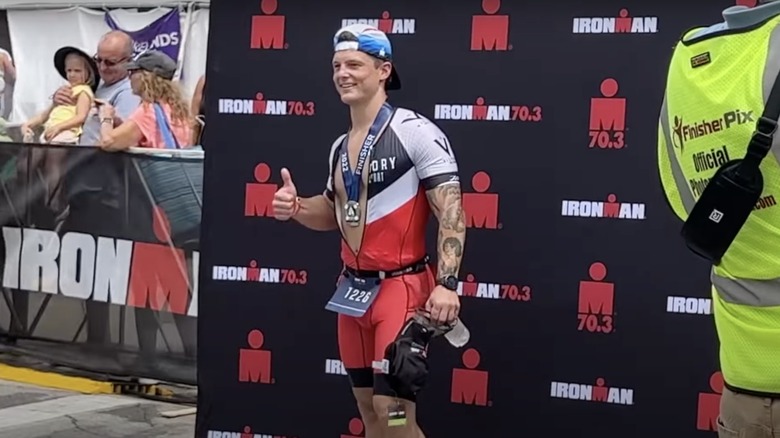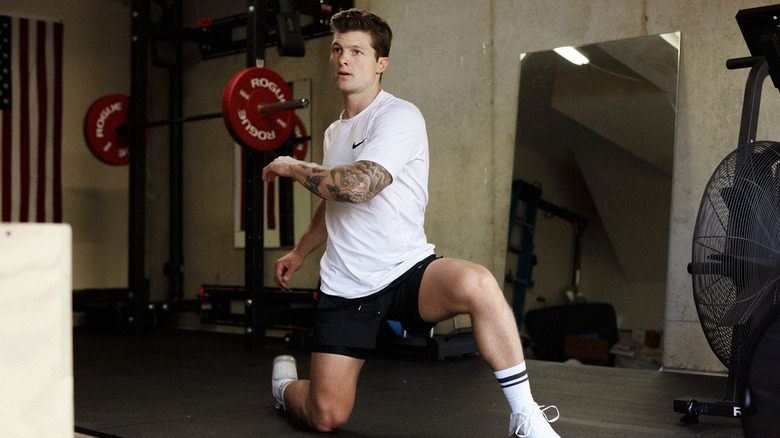TikTok Star Josh Herbert Gets Real About His New Podcast Who Wears The Pants - Exclusive Interview
If you're like us, you could spend countless hours scrolling through TikTok videos. The app has completely transformed the social media atmosphere — and it has completely changed the lives of Josh Herbert and his wife, Abbie. The duo first downloaded the app less than three years ago and have since acquired a massive online following in the millions.
Between recording episodes for their brand-new podcast "Who Wears the Pants," creating online content, training for one of the toughest triathlons in the world, and keeping up with a toddler (and another baby on the way), Josh Herbert opened up to us about what it's really like to be an influencer.
In an exclusive interview with The List, Herbert shared the advice he has for aspiring content creators and fellow athletes, the alternative title that they almost named their podcast, and how his life has completely changed since he first downloaded the TikTok app.
His life has changed a lot since he first joined TikTok
I heard you say in an episode of your podcast, "Who Wears the Pants," that you were initially against creating a TikTok account. What did your wife, Abbie, say to you that ultimately convinced you to join the app with her?
Over the years, I was pushing my music on social media, finding whatever avenues were hitting at the time. When I started pushing my music, there was an app called Viddy, and this was prior to even Vine. I was on that app, and I was pushing stuff, and it was a very early [platform] like TikTok or Vine. Then Vine came along, and I was heavily on Facebook pushing stuff.
Throughout my music career and everything, at that point in my life, when Abbie started doing TikTok, I was like, "I'm done. I'm over all this social media." I was posting videos here and there on Instagram, mainly for friends and stuff.
I was still working a corporate job at the time, and music was on the back burner — then all of a sudden, we saw potential in what TikTok was doing, and we got our first brand deal on our own through it. I was like, "Maybe there's something here." I quickly hopped on the bandwagon with Abbie, and the rest is history.
In what ways do you feel like your life has changed since gaining such a large following?
In all ways. There's a sense of, in a crazy way, calmness that's come over us, because we're doing what we love. We're creating content every day, and we're getting to share it with millions of people, and this is our full-time job now.
In retrospect, when I look back, music — that's a very tough business. I worked on it in jobs my whole life, and to be honest, I was miserable. At all these jobs, it was always just to get by, just to pay rent and put food on the table, and I was always looking at the next thing.
I feel like I've finally arrived at my calling with Abbie, and we're having so much fun right now and living in the moment with all the content we're creating.
It has to be fun to be able to do that with your wife by your side and get to work with her so closely.
It definitely has its ups and downs. You've got to separate the wife from the business partner at times, and we work on that. We do it really well. We love it. She's my best friend. We have a blast making content.
How his podcast came to be
How did you decide on "Who Wears the Pants" for your podcast name? Were there any other alternative options that you almost chose?
We wanted a play on something husband-wife related or like "His and Herberts." We were playing on a bunch of [options] ... almost like when people get married and they do random hashtags on their last names.
We were playing around [with] that, and we were trying to think of something in marriage, and we were pushing stuff around with our manager. Somehow, between all three of us, "Who Wears the Pants" [came up]. It was like, "This is the name." As soon as we all said it, we were like, "Yep, this is it." It worked out perfectly.
If you could have anyone in the world as a guest on your podcast, who would you want to have on?
Wow, that's a great question. I got asked yesterday, "Who would you like to meet?" and I had to think about it. I'm like, "I don't know. There's no one I'm crazy about meeting."
I really like Ed Sheeran. I doubt he would go on a podcast because he likes his privacy, but whenever I was up and coming in music, I would watch a lot of his stuff, and he was a huge inspiration on my sound. I feel like the way he lives his life, I can relate to it. He's a family man now, so if I had to have one person, it'd probably be him.
You mentioned that Ed Sheeran lives a relatively private life, and you and your wife share so much about your lives online and on your podcast. Is there anything in your life that you consider off-limits?
For sure. It's almost a day-to-day thing. We decide, "Hey, do we want to put this out?" Especially with our daughter, I'm very protective, and we're very tasteful about what we put out and make sure it's what we both want. We both decide, "Hey, yeah. We can post this" — or not.
It's almost weird, and I'm starting to realize now that the world's opened back up: For a long time ... you're posting online, [and] you forget people are even watching it, in a way. Then you go out in public, and it's like, "Oh, man. People recognize us, and they know who we are, and they watch our stuff."
But I'm at a point in my life now where I'm content with sharing, and I don't have anything to hide. It's more of sharing from a purpose of helping somebody who's going through something or somebody who can relate, and being an open source, because I wish I'd had that. That's where the direction of social media, I hope, is heading — into this more positive, more open mind frame. That's the direction we want to head.
What it's really like working as an influencer
Is there anything that has surprised you most about being in the social media influencer space?
Having it be my job. I would always see people being "influencers" — and I'm doing the air quotes when I say that — and I'm like, "How are these people [doing this]? They must come from money, or they must be rich, and I'm working these crazy jobs."
I was delivering beer all around the city and all these crazy things, and I'm like, "How is that even a job?" I would ask myself that, but I didn't understand how it worked until I got into that world.
Having this as my everyday job is amazing, and it's shocking at the same time.
What's the biggest advice you have for someone else who aspires to be a content creator or aspires to work in that space?
Number one is: Be your authentic self. There's only one of you, but once you start trying to copy other people or do other things, it becomes less ... There's less gravity toward you, in a sense.
Being your authentic self is special, being true to yourself. That's going to shine through and cut through when you're making content — having your own sound if you're a singer, having your own voice in whatever you want to put your opinion on or whatever you love and your passion is. That's really important, being authentic.
His most recent accomplishment is completing the Ironman Triathlon
Something else that's kept you busy recently is the Ironman Triathlon. What was it that made you want to sign up for it?
It's pretty crazy how things happen. Through social media, Abbie and I set up our own company, and the gentleman who helped us set up our whole payroll system is a multi-time Ironman. Talking to him ... he had this electric personality. I'm like, "Man, what does that guy do? What kind of coffee does that guy have?" His energy exudes. We talked a little bit about Ironman. I'd never thought of it before, but I've always been athletic.
Not even a week later, we went out to dinner with my best friend and his wife, and all of a sudden, my best friend's like, "I'm thinking about doing an Ironman." I was like, "I just talked to this guy. He set up our payroll, but he does multiple Ironmans. I can send you his contact."
He called him that night, and lo and behold, he signed up for the Ironman. He's like, "Dude, you got to do it with me." I'm like, "All right, man." He's my best friend. I'm like, "I'm not going to let you down."
I was so scared because I didn't know how to swim properly — terrified of water, terrified of those distances. I did a 70.3, which is half of the full Ironman, which is still — 70.3 miles is a lot. It was a huge feat for me, personally, in overcoming things, especially the swimming part. I was terrified of that.
How did you overcome the swimming part?
Literally, when I said I didn't know how to swim, I didn't know how to swim. I could float in water and doggy paddle all day long, but as far as free stroking or even getting further in the pool, my first couple days, I was out of breath going one length down the pool. It was tragic ... I was sinking because I have a lot of muscle mass. My legs are all muscle.
In learning, I swam in the pool for seven months, three days a week, so many yards. I finally found a passion and almost a zenness to swimming. That was my breath control, and I would come out of swimming being like, "Wow. I'm ready to go for the day."
It was a new challenge to me, because you weren't swimming in a pool for Ironman. You were swimming in Lake Erie, so it changes the game. I'm not going to lie, I would be up at nights having anxiety. There's horror stories of things going wrong, and there's a lot of people in the water at one time. As I experienced that day, my goggles fogged up a minute into the race. I couldn't see anything. There's people swimming on top of you. You're getting dunked, slammed, kicked in the face, punched in the face.
Not only that, but you're fighting the current. The water's deep, and it's dark water. It's panicky, and there were people hanging on the buoys screaming left and right, but I kept powering through and trusting in all my training and practice. Once I got out of that water, I was like, "All right. It's game time," because that was the turning point for me. "If I can get out of the water, out of the gate, the rest is history."
What he's learned this year about his health
You've shared exercise videos on TikTok, but how did your workout routine change while you were preparing for something as intense as this?
Working out's always been a big part of my life. I wrestled and played hockey growing up, and ... being in the gym was an outlet for me as a kid. [I was] 14, 15 years old, starting to get into the gym, and I found an outlet there. I could channel similar music. It was an outlet for me to go in the gym for an hour and come back feeling great. I'd always do that.
Then I had a passion for running — same thing. When you get out of a run, you feel this free, euphoric sense, and you feel better about yourself. But this type of training was different from everything else. It was very long, extensive bike rides, the swimming, and a high-mileage run. The furthest I've ever run in my life before training for this was maybe like six or seven miles at a relatively slow pace. Pushing up toward 14-mile days or 15-mile days was nothing. I worked my way up where I was like, "I'll go out and run a half marathon, and that's no big deal."
It was crazy to see the change in the build on my physical health, and how the heart rate's all lowered down once you got to different zones, and [it was] really cool to see this type of training.
Looking back at your experience doing the whole triathlon, is there anything you wish you had prepared for differently?
There's a lot of stuff. This is my first one, so I knew nothing going into it. Going into it, I was very tight and very anxious for the swim. Now, knowing it wasn't that big of a deal, it's more of the break in the race. It does start out [there], but definitely the transitions and T1 and T2. That's when you come out of the water and you've got to throw all your bike equipment on, hop on your bike, and go.
I definitely didn't have things organized well, and I actually almost got on my bike, and I was like, "Oh, no. I forgot my water bottle." I didn't put it in the holder, so I had to run back. That lost me a couple of minutes.
On the run, it got hot. It was 95 degrees out on the pavement as soon as I hit the run, so [I'd] hydrate a little bit more next time. And I definitely had more in the tank. I didn't know my time, so I finished in six hours and two minutes. Had I known I was two minutes away from getting sub-six [hours], I could have booked it, because I had a lot left in the tank.
It's being aware of my time and setting up those transition areas a little bit more organized so I can shave off some minutes there. But all in all, I'm pretty proud of myself for my first one, going into it with no expectations.
On fitting fitness into his daily life
How long did you spend training for the Ironman Triathlon beforehand? Were you doing a different thing to prepare each day?
Yes. Usually, throughout the week, I swam Monday, Wednesday, and Friday mornings, and that all fluctuated. You do pyramid — anywhere from a 20-minute swim all the way to a 50-minute swim, as you tapered out. Intermittently, I would add in a quick run or a lift on those swim days, either before the swim or sometime after. Then throughout the week, I would have either a run day, a bike day, or some sort of light lifting day.
Where it got extensive was on the weekends. Saturday and Sunday were the long haul of the training. That was your big bike ride on Saturdays, the long bike ride, and then Sundays were your big runs. My weekends were carved out for that, which drastically changed my lifestyle. I don't go out much anymore on Friday nights, but it definitely changed the way I participated in social events on Fridays and stuff like that, because I was like, "I've got to get up and bike 40 miles tomorrow."
What's the number one thing you always have to have during a typical workout? What do you think is most important?
As far as fueling my body, I always make sure I'm hydrated, either prior to it or during it. I actually enjoy these salt supplements called Element right now. It's a magnesium salt supplement, so I sip on that while I work out, and that's been my go-to.
I only just learned that — I had no nutrition experience in working out prior to Ironman. It really opened my eyes [that] you need to eat. There's a thing called bonking, which I've done, which is not great. Your body shuts down, because your blood sugar and everything's haywire because you're pushing yourself. It's important to get the amino acids, and that's all stuff I learned through the Ironman process. Now I put it into my day-to-day routine, making sure I have enough salt in my body and everything like that.
What you'll see Josh Herbert working on next
What projects are coming up next for you?
I have a lot of stuff in the works. Abbie and I are building a home right now, so that's been a huge process. Another passion of mine is design — interior and exterior design — so I've been heavily involved in the whole process of the home build. I'm super proud of the selections Abbie and I made, and I stay up way too late at night looking at Pinterest, which ... I never thought I'd have a Pinterest account. [laughs] But I'm always getting inspiration, and that's the art side in me. That's taking up a lot of my time right now, getting all that dialed in.
I do have plans on releasing new music in 2023. It's just finding the balance and the time. [I also want to] sign up for another Ironman. There's one coming up in July that I'm heavily looking at, another 70.3, but Abbie and I do have another baby on the way, so I've got to get the green light from her.
Check out more content from Josh Herbert and his wife Abbie on TikTok, YouTube, and Instagram. New episodes of their podcast "Who Wears the Pants" are released each week on Spotify.
This interview has been edited for clarity.
